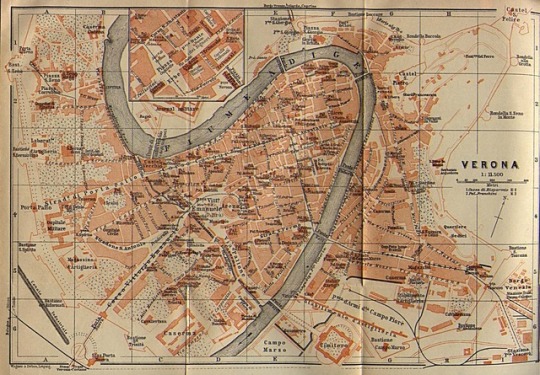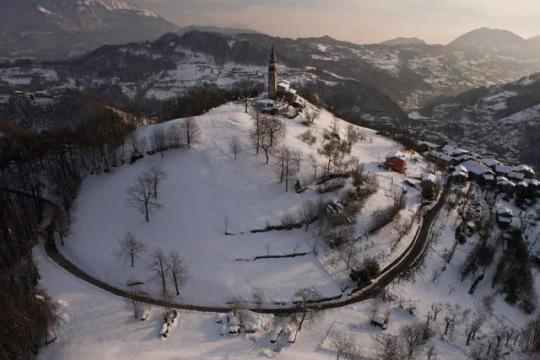Photo
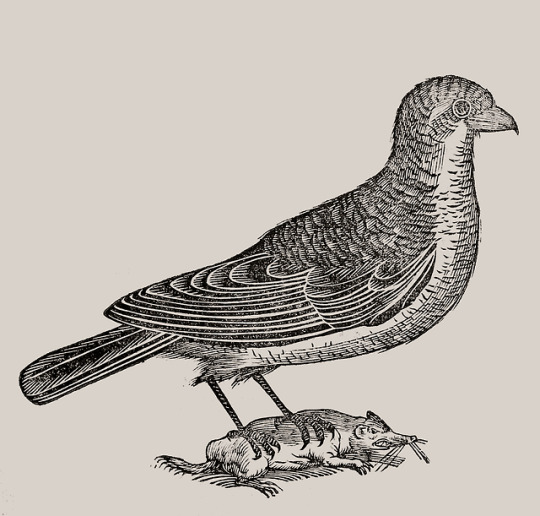
Vlyssis Aldrovandi philosophi ac medici Bononiensis historiam naturalem in gymnasio Bononiensi profitentis, Ornithologiae, hoc est, De avibus historiae libri XII … : cum indice septendecim linguarum copiosissimo - 1599 - via Internet Archive
89 notes
·
View notes
Photo
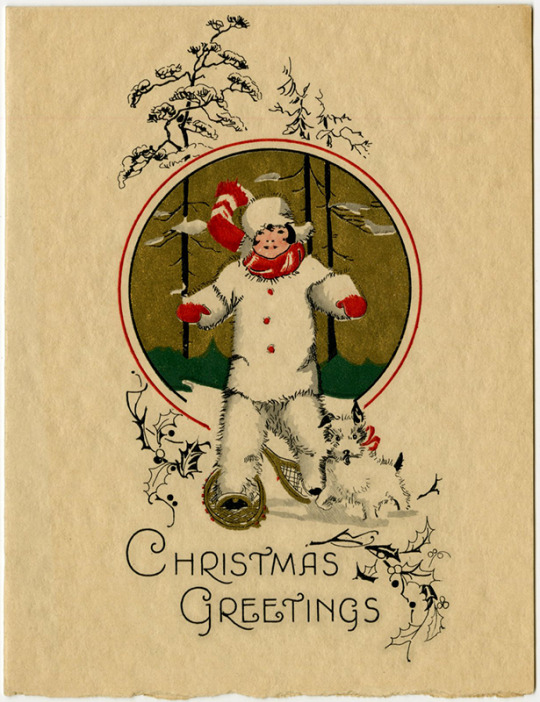
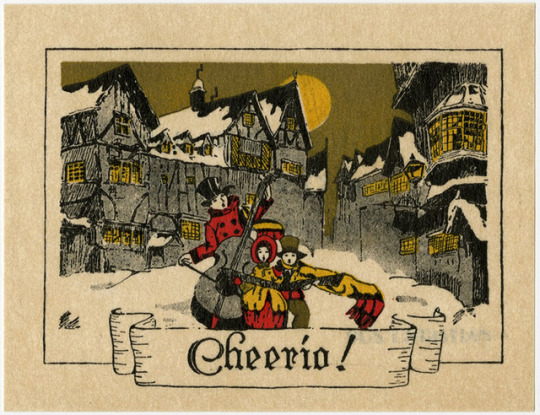
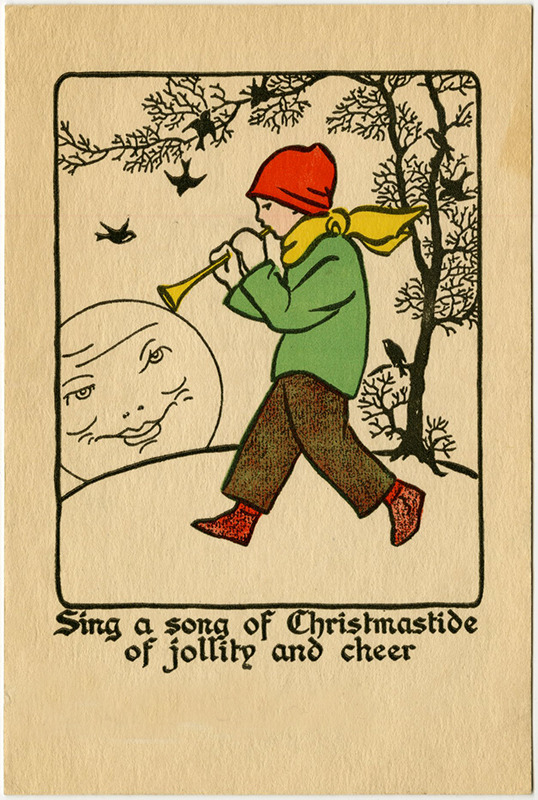
Snow, and Music! Jollity and Cheer!
Holiday greetings circa 1930 from the Adèle Goodman Clark papers, 1849-1978, Special Collections and Archives, James Branch Cabell Library.
202 notes
·
View notes
Text
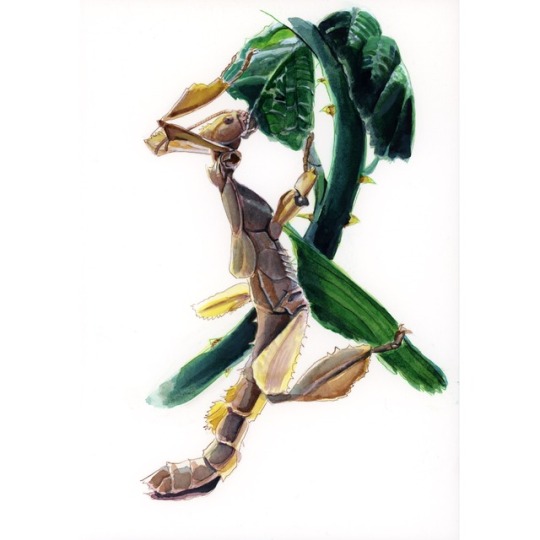
Inktober day 17: Exoskeleton, Giant prickly stick insect
117 notes
·
View notes
Text
ETICA EUDEMEA
Poiché il principio, come nelle altre cose, è causa di ciò che per esso esiste o viene generato, occorre pensare proprio come facciamo nel caso delle dimostrazioni. Se infatti, possedendo il triangolo (angoli la cui somma corrisponde a) due retti, è necessario che il quadrilatero abbia quattro angoli retti, è evidente che la causa di questo fatto è che il triangolo ne possiede due retti. Se però il triangolo mutasse, dovrebbe necessariamente mutare anche il quadrilatero: per esempio, se il triangolo avesse (angoli corrispondenti a) tre retti, il quadrilatero ne avrebbe corrispondenti a sei e ad otto se il triangolo ne avesse quattro. Qualora però il triangolo non cambi e sia caratterizzato da tale proprietà, è necessario che anche il quadrilatero sia tale. Che ciò a cui abbiamo accennato è necessario risulta evidente dagli Analitici; ma ora non è possibile né negare né affermare in modo esatto, a parte quanto abbiamo già detto. Se infatti non esiste nessun'altra causa del fatto che il triangolo sia così, questo sarà una sorta di principio e causa degli stadi successivi. Di conseguenza, se esistono alcuni enti che possono essere in modo contrario (a come sono), è necessario che tali siano anche i loro principi. Infatti la conseguenza di ciò che è necessario è necessaria, quantunque sia possibile che ne provenga ciò che è contrario e molte cose di tal genere sono in potere degli uomini stessi ed essi sono principi di tali cose. Di conseguenza è evidente che tutte le azioni delle quali l’uomo è principio e fattore determinante possono accadere oppure no, e che dipende da lui che accadano, oppure no, quelle cose della cui esistenza o non esistenza è fattore determinante. Ed egli è causa di tutte le cose che dipende da lui fare o non fare, e tutte le cose delle quali egli è causa dipendono da lui.
ARISTOTELE:
Etica Eudemea, Etica Nicomachea, Grande Etica, a cura di Lucia Caiani, CLASSICI U. T. E. T. P. 1223a
0 notes
Quote
PHILOSOPHERS have often distinguished two kinds of truth: the truth of some statements is logical, necessary, based upon meaning, while that of other statements is empirical, contingent, dependent upon the facts of the world. The following two statements belong to the first kind:
(1) 'Fido is black or Fido is not black'
(2) 'If Jack is a bachelor, then he is not married'
In either case it is sufficient to understand the statement in
order to establish its truth; knowledge of (extra-linguistic)
facts is not involved.
However, there is a difference.
To ascertain the truth of (1), only the meanings of the logical particles ('is,' 'or,' 'not') are required; the meanings of the descriptive (i.e., nonlogical) words ('Fido,' 'black') are
irrelevant (except that they must belong to suitable types). For (2), on the other hand, the meanings of some descriptive words are involved, viz., those of 'bachelor' and 'married.'
Carnap, R., Meaning Postulates, Philos Stud (1952) 3: 65 - 73 -- pag. 65.
2 notes
·
View notes
Photo
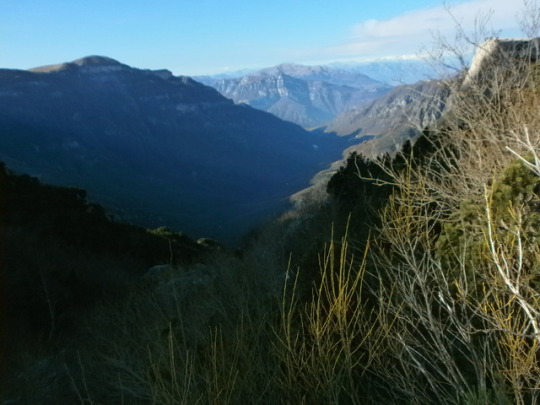
La Val d’Ala da Passo Pertica
0 notes
Quote
A MAP OF VERONA
Quelle belle heure, quels bons bras
me rendront ces régions d'où mes
sommeils et mes moindres mouvements?
A map of Verona is open, the small strange city;
With its river running round and through, it is river-embraced,
And over this city for a whole long winter season,
Through streets on a map, my thoughts have hovered and paced.
Across the river there is a wandering suburb,
An unsolved smile on a now familiar mouth;
Some enchantments of earlier towns are about you:
Once I was drawn to Naples in the south.
Naples I know now, street and hovel and garden,
The look of the islands from the avenue,
Capri and Ischia, like approaching drum-beats—
My youthful Naples, how I remember you!
You were an early chapter, a practice in sorrow,
Your shadows fell, but were only a token of pain,
A sketch in tenderness, lust, and sudden parting,
And I shall not need to trouble with you again.
But I remember, once your map lay open,
As now Verona’s under the still lamp-light.
I thought, are these the streets to walk in the mornings,
Are these the gardens to linger in at night?
And all was useless that I thought I learned:
Maps are of place, not time, nor can they say
The surprising height and colour of a building,
Nor where the groups of people bar the way.
It is strange to remember those thoughts and try to catch
The underground whispers of music beneath the years,
The forgotten conjectures, the clouded, forgotten vision,
Which only in vanishing phrases reappears.
Again, it is strange to lead a conversation
Round to a name, to a cautious questioning
Of travellers, who talk of Juliet’s tomb and fountains
And a shining smile of snowfall, late in Spring.
Their memories calm this winter of expectation,
Their talk restrains me, for I cannot flow
Like your impetuous river to embrace you;
Yet you are there, and one day I shall go.
The train will bring me perhaps in utter darkness
And drop me where you are blooming, unaware
That a stranger has entered your gates, and a new devotion
Is about to attend and haunt you everywhere.
The flutes are warm: in tomorrow’s cave the music
Trembles and forms inside the musician’s mind,
The lights begin, and the shifting crowds in the causeways
Are discerned through the dusk, and the rolling river behind.
And in what hour of beauty, in what good arms,
Shall I those regions and that city attain
From whence my dreams and slightest movements rise?
And what good Arms shall take them away again?
Reed, Henry. “A Map of Verona.” Listener 27, no. 687 (12 March 1942): 343.
0 notes
Photo
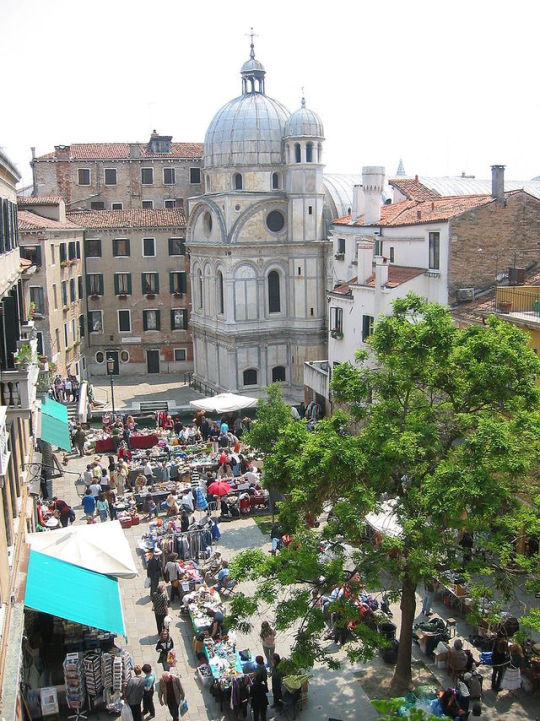

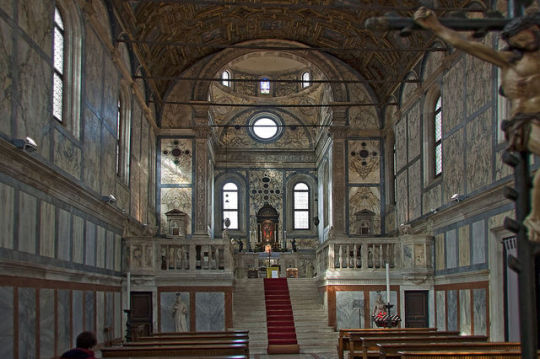
Santa Maria dei Miracoli e mercatino - Venezia
foto di Roberto Catullo
0 notes
Quote
By the logical syntax of a language, we mean the formal theory of the linguistic forms of that language -- the systematic statement of the formal rules which govern it together with the development of the consequences which follow from these rules. A theory, a rule, a definition, or the like is to be called formal when no reference is made in it either to the meaning of the symbols (for examples, the words) or to the sense of the expressions (e.g. the sentences), but simply and solely to the kinds and order of the symbols from which the expressions are constructed.
Rudolf Carnap, Sintassi logica del linguaggio, pag. 1, 1934
0 notes
Photo
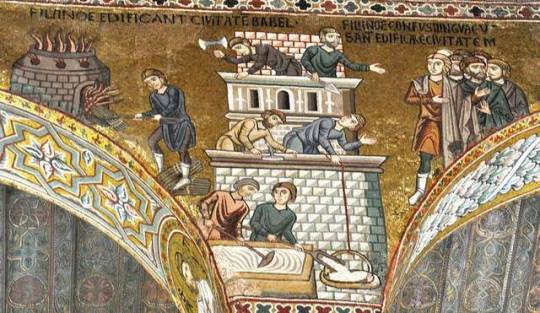
12th century Mosaic Palatine Chapel, Palermo, Sicily
Photographed at the site by Richard Stracke, shared under Attribution-NonCommercial-ShareAlike license.
http://www.christianiconography.info/sicily/towerBabelPalatineChapel.html
0 notes
Quote
1 Tutta la terra parlava la stessa lingua e usava le stesse parole.
2 Dirigendosi verso l'Oriente, gli uomini capitarono in una pianura nel paese di Scinear, e là si stanziarono. 3 Si dissero l'un l'altro: «Venite, facciamo dei mattoni cotti con il fuoco!» Essi adoperarono mattoni anziché pietre, e bitume invece di calce. 4 Poi dissero: «Venite, costruiamoci una città e una torre la cui cima giunga fino al cielo; acquistiamoci fama, affinché non siamo dispersi sulla faccia di tutta la terra». 5 Il SIGNORE discese per vedere la città e la torre che i figli degli uomini costruivano. 6 Il SIGNORE disse: «Ecco, essi sono un solo popolo e hanno tutti una lingua sola; questo è il principio del loro lavoro; ora nulla impedirà loro di condurre a termine ciò che intendono fare. 7 Scendiamo dunque e confondiamo il loro linguaggio, perché l'uno non capisca la lingua dell'altro!» 8 Così il SIGNORE li disperse di là su tutta la faccia della terra ed essi cessarono di costruire la città. 9 Perciò a questa fu dato il nome di Babel, perché là il SIGNORE confuse la lingua di tutta la terra e di là li disperse su tutta la faccia della terra.
Bibbia - Genesi 11,1-9
0 notes
Photo
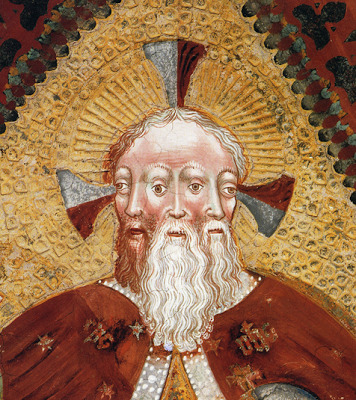
Vigo di Fassa - Chiesa di Santa Giuliana - La Santissima trinità - prima metà XVI sec.
0 notes
Text
La fede nella verità
Non c'è ricerca filosofica o scientifica, né c'è
pensiero di nessuna sorta senza la fede del pen-
siero in se stesso, o nel proprio valore, senza il
convincimento spontaneo e incrollabile di pen-
sare la verità. Lo scettico, che crede di tagliare
alla radice questa fede, quando sospende l'as-
senso, come il solo partito ragionevole che resti
al suo pensiero, si ferma nella certezza incon-
cussa di questa ragionevolezza della sua sospen-
sione, e vive, poiché continua a pensare, della
fede in questo suo ritroso e vuoto pensiero.
Il fatto del pensare, eperò della filosofia, quale
che sia la soluzione a cui s' indirizzi, presup-
pone questa affermazione della verità del pen-
siero nel pensare quello che pensa attualmente.
Giovanni Gentile, L’atto del pensare come atto puro, Firenze 1937, sez. 1
0 notes
Quote
Valmorbia, discorrevano il tuo fondo
fioriti nuvoli di piante agli àsoli.
Nasceva in noi, volti dal cieco caso,
oblio del mondo.
Tacevano gli spari, nel grembo solitario
non dava suono che il Leno roco.
Sbocciava un razzo su lo stelo, fioco
lacrimava nell'aria.
Le notti chiare erano tutte un'alba
e portavano volpi alla mia grotta.
Valmorbia, un nome ,- e ora nella scialba
memoria, terra dove non annotta.
Eugenio Montale “Ossi di seppia” 1925
1 note
·
View note
